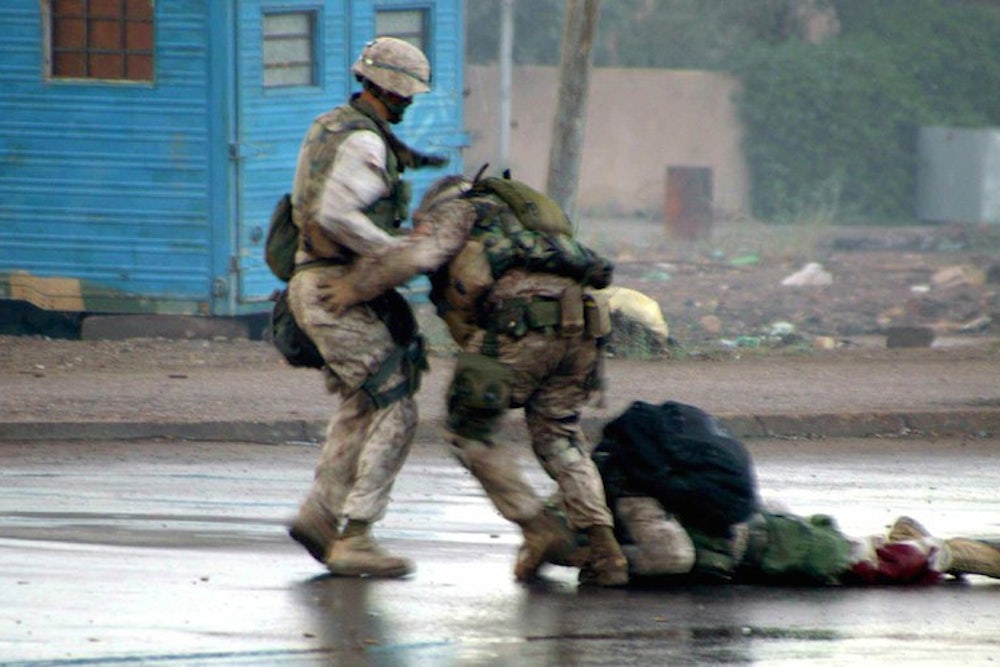Between November 7 and 9, 2004, a remarkable thing happened in Fallujah: It rained. Throughout the preceding summer, while our rifle platoon waged a counter-insurgency in Haditha, Hit, and other Anbari backwaters, it never rained. Within the platoon we had a pool—ten bucks got you in—try your luck and pick the first day of rain. When the dust finally turned to mud all 46 of us were staged just outside the city, hunkered down in slit trenches, waiting for the assault to begin.
I don’t remember anybody collecting on the pool.
All it takes is the sight of someone sprinting along a wet crosswalk and I’m back in Fallujah and back to one street in particular: Highway Ten. Veterans of the battle each have their story of crossing Highway Ten’s expansive four lanes covered by machinegun fire, with insurgents dug into the buildings on the far side, defending this, their main line of resistance. The story of Gunnery Sergeant Ryan Shane, a Marine from my infantry battalion, has always remained close. On November 9, his rifle platoon perched on a rooftop, covering another platoon that rushed the crossing’s gauntlet. Within minutes, a slug ripped through the leg of Sergeant Lonny Wells, felling him in the open. He lay face down, blood pooling around his waist, moving just a little. Leaving his rifle behind so it wouldn’t slow him, Ryan went after Lonny.
A Marine combat cameraman captured the scene in four photographs. In the first, Ryan stands in the wet street, bent over Lonny. His 220-pound frame tugs the drag strap on Lonny’s body armor. In the second, another Marine runs to Ryan’s side, trying to help. Clumsily, the second Marine bends over Lonny while Ryan keeps pulling. The next frame was taken just as a bullet tears into Ryan’s lower back, scrambling his stomach. He’s on his heels, falling. The other Marine watches in a half sprint, heading for cover. The final frame is Ryan and Lonny, both laying face down on the street in the rain.
Lonny is dead. Ryan will survive.
The photos ran in Leatherneck Magazine—the magazine of the Marines—a month later under a simple headline: “Uncommon Valor.”
Nearly two years later, during the Al-Anbar Awakening, 50 veterans of the Fallujah Battle gathered in an auditorium in Camp Lejeune. Ryan Shane would be decorated for his actions. Since Lonny died, Ryan’s 220 pounds had shrunk to 150. After countless surgeries, he’d been medically discharged from the Corps. The toll his stomach wound had taken on his body could be seen in his atrophied frame, but it was the forced separation from the Corps he loved which left the deeper wound. You could see that in his eyes.
I sat in my uniform, a few rows back. We came to attention as the adjutant read the citation for Ryan’s Bronze Star. Our Commanding General pinned it on his chest, and ceded the floor to Ryan. He thanked his family for their care during his slow recovery. He thanked the Marines who ran to his rescue that day. Then his voice thickened. He held his stare upwards, holding it on the auditorium lights, as if speaking to a place outside that room.
“I’m finding it really hard,” he said, “to accept that my greatest achievement as a Marine, this medal, also comes from my greatest failure. I didn’t save Lonny that day.”
Afterwards, one by one, we left our seats and shook Ryan’s hand. Many of us went on to serve more deployments in Iraq and Afghanistan. A battle as big as Fallujah never came along again, though there were many others like it.
In valleys, hamlets, and cities too countless to number, Ryan Shane’s words held true. Our greatest achievements were bound to our greatest failures. Just as in Fallujah, we wound up destroying many places in order to save them. Looking back through the years, this final point seems undeniable to me.
It’s old as war.
In recent months, with the rise of the Islamic State of Iraq and Al-Sham in Anbar Province, or the increased influence of the Iranian Government in Iraq’s internal affairs, quantifying whether our efforts in that country were worthy of our sacrifice seems an increasingly complex and unknowable arithmetic. Each of us has tallied the personal cost and come to a solution. As memories cloud, and in some cases burn, I imagine our solutions will change.
In hindsight, the only thing I know with complete clarity about Fallujah, the Iraq War, any war, is that achievement always couples with failure. Like a lot of guys, I learned that in the rain.
